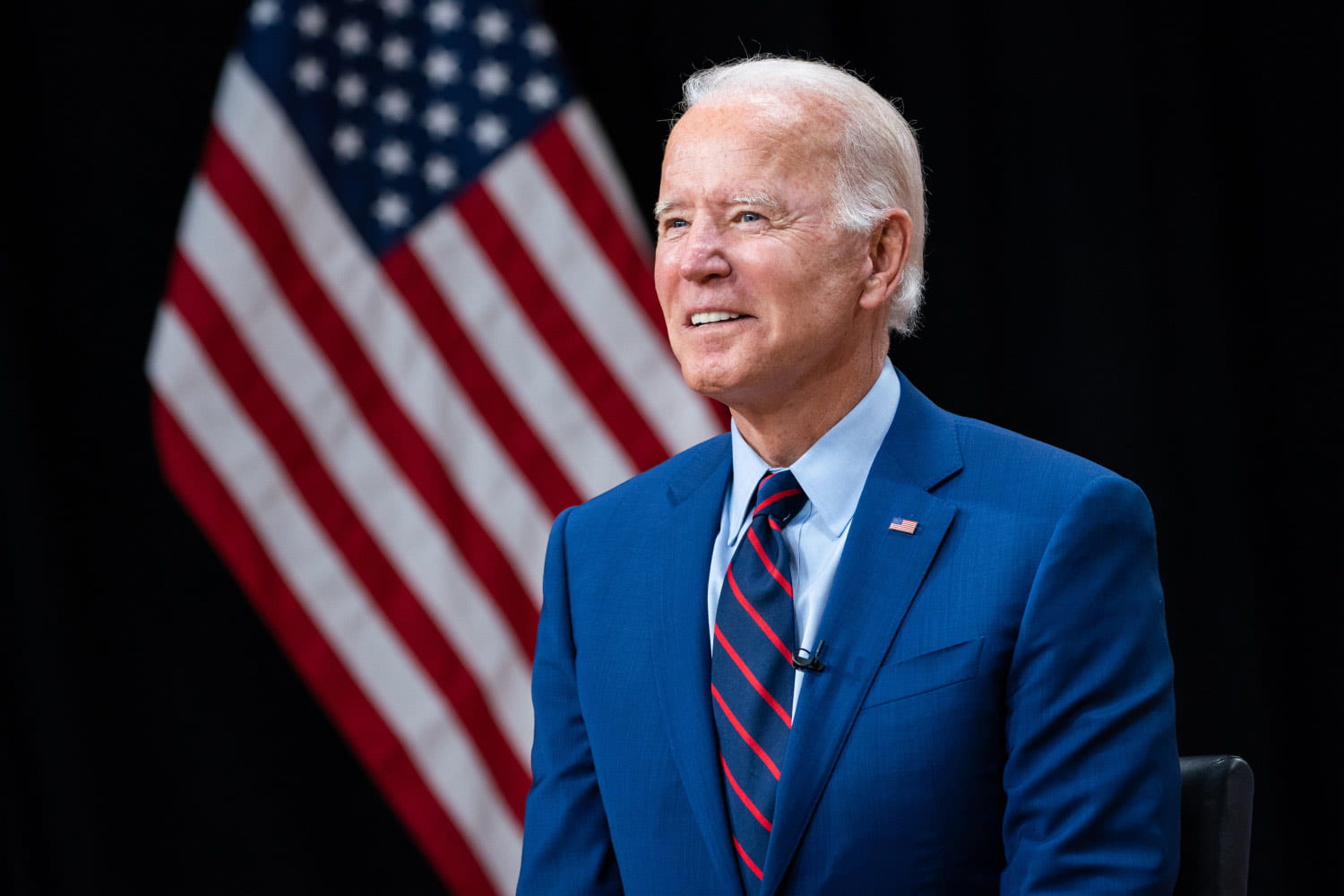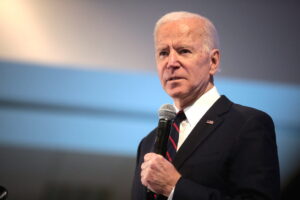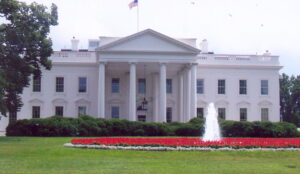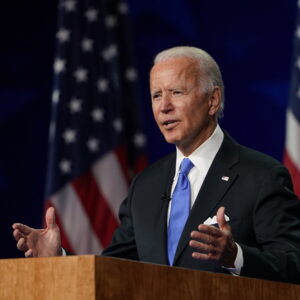Tag: Biden
An Open Letter to President Biden
by David Salzillo Jr. '24 on November 17, 2022
Opinion Staff
Editorials

Dear President Biden,
Congratulations. As I am writing this, your party has managed to hold the Senate, and still—as of Nov. 14—has a fighting chance of holding the House. Your instincts have proven correct: above and beyond political disagreements and the public’s view of your presidency, the majority of voters expressed their desire to prevent government by the people, of the people, and for the people from “perishing from the earth.” Yes, it was a close call, and too close for me to be content with. However, the majority did speak with a resounding voice, bringing a decisive defeat to election deniers and other anti-democratic rhetoric within the Republican Party. For now, the threat of authoritarianism in America has stayed.
I, for one, give you your proper credit. When others in the party did not, you had faith in the working people across this country making the right choice. And when Democratic pundits fell into hysterics about “red waves,” you kept calm. But now we have won. And, like Robert Redford in The Candidate, we must ask this question: “What do we do now?” The battle is not over, and the stakes are higher than ever.
We see the rise of “new and improved” Trumpian and anti-democratic politicians like Ron DeSantis. We see one of our two major political parties still consumed by election denialism and political primaries that reward these election deniers. Worst of all, we see that the Republican Party establishment is, as it stands now, far too morally bankrupt to repudiate Trumpism once and for all. Even if Republican Party leaders cast Trump aside, they will only cast him aside because he “didn’t work” like they wanted him to—like a child throwing away a dysfunctional toy.
Our politics cannot survive like this for much longer. One might say the Republican Party will implode if it continues on this path. On the other hand, it might not. It might instead take us on more of a “winding road” toward authoritarianism. We cannot take the chance.
You want to be a great president. What’s more, you need to be a great president for our republic to survive. To overcome such fundamental threats to our democracy, nothing less than a great transformation of American society is necessary. And when the problem is our politics and, more to the point, our politicians, then a top-down transformation appears even more appropriate. Consider the example of history too. Each time we have had a “crisis of confidence” in our democracy—whether during the Civil War or the Great Depression—a great President has led us closer to the Promised Land.
Like Thomas Paine once said of the American Revolution, “we have it in our power to begin the world over again.” But that requires an ambitious agenda, on par with Johnson’s Great Society and FDR’s New Deal. Of course, I can hear your advisers saying, “But we have done that. Haven’t you heard about our historic investments in infrastructure? And what about our historic initiative to get Medicare to negotiate prescription drug prices?” I respond simply: the infrastructure investments, historic as they are, are like pouring a bucket of water onto a California wildfire. Likewise, Congress passing a bill allowing Medicare to negotiate prescription drug prices, while appreciated, was long overdue.
What I am saying is go bigger. Think bigger. President Johnson could have made historic progress on civil rights without passing the Civil Rights Act of 1964 and the Voting Rights Act of 1965. Why? Because other presidents had not been able to do much of anything on that front. And President Johnson could have made historic investments in combating poverty without the Great Society. All he had to do was invest $1 more than Kennedy or Roosevelt had. But that is not what he did. History rightly celebrates Johnson for his vision. Without that type of thinking, would anybody have the chance to enjoy the benefits of Medicare and Medicaid?
Nonetheless, I realize you face certain practical limitations. By all means, acknowledge them. For my part, I will be brutally honest: this is going to be hard, and it at times will seem impossible. It will take some masterful politicking, just as it did in Johnson’s time. Even then, advancing a bold legislative agenda is no less impossible than it was to get the Civil Rights Bill through a Senate with segregationists and the filibuster.
I am confident the American people will follow a good vision, with results that positively affect their everyday lives. Voters may not be able to fact-check as well as they could, but they can read “the signs of the times.” If your Administration passes the bills, your Administration will reap the rewards.
It’s getting there that’s the problem. You have a possible Republican House, you have at least 50 Democratic Senators, and you have Senators Joe Manchin and Kyrsten Sinema. What could you possibly do with that?
It may look like you got the wrong deck of cards for a great presidency. Nevertheless, there is still some hope. But not in conventional compromising. Those days are over, for better or worse. I propose to you, as St. Paul did to the Corinthians, a “better way.” Consider again Johnson’s Civil Rights Bill. As Jonathan Rauch notes in “How American Politics Went Insane,” getting that bill passed meant getting it past House Republican leader Charles Halleck of Indiana. How? Was it through a passionate debate of the issues or principled arguments for the equality of all people? No. A NASA research grant for Halleck’s district was enough to do the job. This approach to politics might make one cynical, but not me. Instead, it shows how even political self-interest can lead to monumental change.
I will add this: per the old cliché, “nothing succeeds like success.” Republicans will not compromise on their own; the people must force them to take their places at the negotiating table. If your Administration can pass more and more ambitious legislation—even if by one vote—and people start to like what you are doing, then Republicans will have to compromise. Self-interest and self-preservation will drag them along. As Martin Luther King Jr. said, “A genuine leader is not a searcher of consensus but a molder of consensus.” President Johnson likely would have agreed. Compromise, indeed, is not exactly the right word to describe how Johnson passed the Civil Rights bills; arm-twisting is perhaps the more accurate term. Johnson used every method of persuasion he had to get his party and those in the other party onboard.
Obviously, you might not want to imitate everything Johnson did. But a little more arm-twisting may do some good, especially if Democrats gain a seat in the Senate and especially if somehow Democrats hold the House. Arm-twisting, aggressive public relations efforts, and some good old-fashioned backroom negotiations. They have never failed the traditional politician, and it may be fatal to go back to the “let’s split everything down the middle” model of compromise. Instead of splitting things down the middle (after all, what is the middle now? The halfway point between you and Marjorie Taylor Greene?), we must push the middle over.
Thomas Paine once said, “we have it in our power to begin the world over again.” And if we do not take advantage of that power, then others will. And we may not like the world they give us.
Vaccinated Americans Get Breath of Fresh Air: Biden Removes Mask Mandate for COVID Vaccine Recipients
by The Cowl Editor on May 6, 2021
National and Global News
by Sydney Olinger ’23
News Staff
As of Tuesday, April 27, President Joseph Biden, alongside the CDC and Dr. Anthony Fauci, released new guidelines regarding the wearing of face masks. Biden addressed the immense progress America has made in reducing the number of COVID-19 cases and deaths by continuing to wear masks, social distancing, and now getting vaccinated. With full vaccination comes many new privileges, one of which is the freedom to not wear a face mask outdoors.
Experts have determined that wearing face masks throughout this pandemic has been one of the most effective ways of controlling virus transmission.
This new mandate has been up for debate for a few months; however, since the release of the vaccine. Because many people are now getting the vaccine and most COVID-19 transmission occurs indoors, it was finally decided that a fully vaccinated person does not have to wear a mask outdoors. These new perks of not having to wear a mask in certain places will hopefully be an incentive for every person to get out and get vaccinated.
“So, for those who haven’t gotten their vaccination, especially if you’re younger or thinking you don’t need it, this is another great reason to go get vaccinated,” Biden said. People are considered fully vaccinated by the CDC two weeks after the second dose of the Pfizer/BioNTech or Moderna vaccines or two weeks after the single-dose Johnson & Johnson vaccine.
Unfortunately, though the vaccine certainly makes it much less likely that vaccinated people will test positive for COVID-19 or experience symptoms, there is still a small chance that a vaccinated person could carry the virus and possibly transfer it to an unvaccinated person. It is also important that those who received the Moderna or Pfizer/BioNTech vaccines remain especially cautious, wear a mask, and socially distance before their second dose.
Coronavirus cases have decreased by 16 percent in just the last week as the amount of people in the U.S. who have received the first dose of the vaccine surpassed 140 million people. This means that 32 percent of the population is now fully vaccinated, with 44 percent having received one dose of the two-shot vaccine. Despite the high numbers of vaccinated citizens, many more will need to receive the vaccine before the country can return to normal life.
There has been hesitancy surrounding the vaccine, mainly as a result of fear of possible long-term effects. However, the vaccines were developed over a fairly long period of time, ruling out the majority of possible risks. Moreover, as of right now, there have been very few extreme negative reactions to the vaccines. It is important that we trust the experts and health professionals who worked diligently to find the most effective way to prevent the spread of the virus that we have faced for over a year now.
Attempting to Get Vaccines and Stimulus Checks for All: Biden Administration Plans on Rapid COVID Relief
by The Cowl Editor on March 18, 2021
National and Global News

by Sydney Olinger ’23
News Staff
March 11 marks the one-year anniversary of the nationwide shutdown that was enacted due to the rapid spread of COVID-19. A year ago today, no one could have predicted that our country would still have increasing cases and harsh COVID-19 regulations. In his first prime-time address to American citizens, given on this one-year anniversary, President Joseph Biden announced that he will direct states to make all adults vaccine-eligible by May 1.
This directive will hopefully mark the start of our country’s return to normalcy, but Biden noted that not all adults will be vaccinated by May 1. Therefore, some COVID-19 regulations, such as mask-wearing and not gathering in large crowds, need to be maintained.
The federal government is in control of distributing the vaccine to each state, but states are given discretion in deciding who is eligible. Most states have been consistent in deciding who receives priority for the vaccine, but some have different guidelines for which groups are eligible first. According to Biden, all adults should be able to get in line for their first dose of the vaccine by May 1, as long as the country has enough doses and rollout goes successfully.
On the same day as this prime-time address, Biden signed a $1.9 trillion COVID-19 relief package into law. The intent of this bill is ultimately to help Americans who are struggling financially. The bill also aims to stimulate an American economy that has been facing major challenges for the last year, as countless businesses have shut down or reduced capacity in order to limit the spread of the virus.
Biden’s plans for returning the country to some semblance of normalcy offered a sense of hope to many people and businesses in the country. With the increased distribution of vaccines to all adults willing to get the vaccine, Biden hopes that we will be able to have as close to a normal Fourth of July that we possibly can. “By July the Fourth, there’s a good chance you, your families and friends, will be able to get together in your backyard or in your neighborhood and have a cookout or a barbecue and celebrate Independence Day,” said Biden.
Despite the fact that Biden hopes we will be able to enjoy a fairly normal holiday, he is still encouraging people to not gather in large crowds. As vaccine rollouts progress in the coming weeks, the CDC will also update guidelines regarding travel, work, and gatherings. Depending on the number of cases as well as deaths, the first holiday we should be able to celebrate fully with people outside of immediate households will be Independence Day. “After this long hard year. . . [we] will make this Independence Day something truly special where we not only mark our independence as a nation but begin to mark our independence from this virus,” stated Biden. Though we should remain hopeful that we will return to a sense of normalcy soon, we must also continue to follow the safety guidelines set by the CDC.
Biden also asked Americans to do their part to help the country make it to the other side of the pandemic. “A lot can happen,” Biden said. “Conditions can change. The scientists have made clear that things may get worse again. As new variants of the virus spread, we’ve got work to do to ensure that everyone has confidence in the safety and effectiveness of all three vaccines.” Throughout his speech, Biden expressed empathy and compassion for the lives lost during the pandemic both within our country and across the world, while also offering hope to the nation that we will overcome the virus and all of the pain it has brought.
Biden Takes Limited Action Against Saudi Prince: Decision Stirs Controversy Within Biden’s Own Party
by The Cowl Editor on March 4, 2021
National and Global News

by Eileen Cooney ’23
News Staff
On Friday, Feb. 26, the Biden administration released a report implicating Saudi Prince Mohammed bin Salman in the 2018 assassination of journalist Jamal Khashoggi. Khashoggi was a 59-year-old U.S. resident and an outspoken critic of the Saudi royal family who was killed and later dismembered inside the Saudi consulate.
Democrats and former Central Intelligence Agency director John Brennan have overtly criticized President Joseph Biden for not directly punishing or speaking out against the Saudi Arabian crown prince. Biden did sanction a top aide to the prince, but he did not explicitly punish MBS, even though it is widely acknowledged that the prince ordered the killing of Khashoggi.
Since the Saudis are primary buyers of American-produced guns, arms, and other military weapons, the kingdom largely escaped retaliatory sanctions during Donald Trump’s presidency, and this pattern seems to be continuing under the Biden administration.
Many Democrats and members of the human rights community are outraged at the Biden administration’s response, especially after Biden himself called Saudi Arabia a “pariah state with no redeeming social value” during his 2020 campaign. Many of these people are pressing Biden to at least impose some travel sanctions against the crown prince.
In response, Secretary of State Antony J. Blinken, announced plans to add a “Khashoggi ban,” which would restrict visas to all who are deemed to be participating in state-sponsored actions to hurt journalists and other dissidents around the globe. This is part of the State Department’s efforts to create a novel category of human rights abuse known as “extraterritorial repression,” which has become a growing issue in countries such as Russia, China, and Turkey.
Jen Psaki, the White House press secretary, defended the Biden administration’s actions saying, “Historically and even in recent history, Democratic and Republican administrations, there have not been sanctions put in place for the leaders of foreign governments where we have diplomatic relations and even where we don’t have diplomatic relations.” She says that Biden and his foreign relations team think there are more effective ways to make sure that an atrocity like this does not happen again, and that they want to leave room to work with the Saudis and to come to an agreement that serves the interests of both sides.
This controversy comes in the wake of Biden announcing the end of U.S. support for offensive operations in Yemen earlier this month. Last month, Biden also froze sales of precision-guided munitions to Saudi Arabia, announcing that he wanted to assess the potential human rights abuses that were occurring.
On 60 Minutes back in October 2018, former President Trump said that there are other ways to impose penalties on the Saudis and that he would not want to see the U.S. take actions that “hurt jobs…or lose an order like that.”
It remains to be seen what implications this will have on Biden’s future dealings with Saudi Arabia. For now, the administration has announced that Biden will conduct relations solely through King Salman, the crown prince’s father.
Welcome, Folks, to the Biden Administration: A Closer Look at the First 100 Days in Office
by The Cowl Editor on February 11, 2021
National and Global News

Photo courtesy of pixnio.com.
by Katherine Morrissey ’22
News Staff
Joseph Biden, Jr., ran a successful campaign grounded on a platform that aligned itself with the Democratic Party’s core beliefs, ultimately resulting in his inauguration as the 46th president of the United States.
The significance of an administration’s first 100 days in office dates back to the incredible feats accomplished by President Franklin D. Roosevelt at the start of his presidency in 1933. In the wake of the Great Depression, Roosevelt inherited a country in economic tatters with nearly a quarter of the nation unemployed following the stock market crash of late 1929. However, Roosevelt did not let the circumstances delay implementing his progressive agenda to help combat the economic and social effects of the Great Depression through the passage of 15 bills.
After being sworn in on Jan. 20, President Biden inherited a United States in a period of distress, much like President Roosevelt did in 1933. However, many would argue that President Biden has perhaps inherited circumstances that are far more unprecedented.
Within the last year, according to the New York Times, over 400,000 Americans have lost their lives during the nation’s struggle to combat the COVID-19 pandemic. Additionally, the pandemic has had detrimental effects on the country’s economic performance.
According to the Bureau of Economic Analysis, the United States experienced two consecutive quarters of decline in gross domestic product, indicative of a recession. Furthermore, it recorded a decrease of 9.1 percent in the second quarter of 2020. This marked the country’s starkest quarterly drop of economic output in recorded history—quarterly GDP has been recorded since 1947 and has never exceeded a drop of more than three percent throughout various recessions.
Given that the nation is faced with such dire circumstances as a result of the ongoing pandemic, a large part of President Biden’s agenda for the beginning of his administration involves taking swift action to combat the ongoing public health and economic crises. While President Biden has made significant promises to combat COVID-19, he also plans to make good on other pledges he made during his campaign regarding other key issues. For example, he has promised to send a bill to Congress which would be for “legislative immigration reform that will modernize our immigration system and give nearly 11 million undocumented immigrants a roadmap to citizenship.”
In regard to the climate and environmental concerns of the country, President Biden promised to sign two executive orders. The first will create a plan to reach a one hundred percent clean energy economy and net-zero emissions by 2050. The next would look “to conserve 30% of America’s lands and waters by 2030.”
On the note of civil rights, President Biden promised to repeal the Trump-era military ban on transgender individuals and restore the protections and provisions of the Obama administration concerning transgender rights.
Additionally, President Biden signed executive orders that included rejoining the Paris Climate Agreement, launching a “100 day mask challenge,” extending student loan pause, launching a Whole-of-Government Initiative to Advance Racial Equity, halting construction of the southern border wall, restoring protection of DREAMers, reversing the Muslim ban, and ensuring worker protections by mandating that employees follow CDC guidelines.
While many frequently criticize Biden for his centrist or moderate beliefs amongst his Democratic constituents, these actions taken on his first day in office actually demonstrate his commitment to following through on a progressive agenda, regardless of the tumultuous times our country is enduring.
Going forward, Americans can expect the Biden Administration to continue to be aggressive in attempting to implement the policies they promised on the campaign trail, as well as in reversing Trump-era policies.
The administration is currently working with Congress to reach a compromise to provide greater economic relief to citizens through another round of stimulus checks.
Although the circumstances are different, the legacy of President Roosevelt’s first 100 days in the Oval Office seems to be shaping the Biden Administration’s approach to office as Biden optimistically attempts to steer the United States out of a historically challenging period and into one of hope and prosperity.
The Painful Transition of Power: Mixed Emotions as New Presidential Administration Takes Office
by The Cowl Editor on February 4, 2021
National and Global News

by Katherine Morrissey ’22
News Staff
On Jan. 20, at 12 p.m., Joseph R. Biden, Jr. was sworn in as the 46th President of the United States. While his inauguration marked the end of President Donald Trump’s four-year term and an unprecedented election cycle, it also came at the end of a historic month of strife and terror.
As legislators joined to officially count and certify electoral votes, a large crowd gathered nearby for what would become one of President Trump’s most memorable rallies. However, what followed on this date would shock the nation to its core.
Around 1 p.m., Americans watched as rioters from the protests began to attack Capitol police as they attempted to enter the Capitol building. Their motive: to delay and stop the certification of the election. Due to concerns about the violent nature of the event, legislators were ordered to shelter and eventually evacuate.
By 2 p.m., the rioters had breached the Capitol by scaling walls, breaking windows, and passing through security with violent force. An hour later, they reached the House Chamber armed with zip ties and cell phones to record their actions. Many videos and photos that rioters took on the Senate floor eventually began circulating the internet and news channels, with some images depicting disturbing symbols of white supremacy.
The Capitol was not secured until after 5 p.m. Following the attack, about 1,100 National Guard troops were mobilized. Congress was able to reconvene by the late evening and eventually certify the remaining electoral votes, but not before five individuals lost their lives in the assault.
Three police officers died in the days immediately following the Capitol riot: Brian Sicknick, who died of injuries sustained during the incident, and Howard Liebengood and Jeffrey Smith, who took their lives after defending the Capitol building on Jan. 6. Their deaths highlight a stark contrast between the attack on Capitol police and the Republican Party, which prided itself on “backing the blue” and supporting law enforcement.
During and following the events at the Capitol, many criticized President Trump’s language and overall delay in response, claiming he did not condemn the actions of those involved, and in some situations, seemed to incite or support it.
During the rally, President Trump continued to assert the false notion that the election results were invalid, stating, “We won this election, and we won it by a landslide.” He continued, “We will stop the steal,” in reference to the election. He also stated, “If you don’t fight like hell, you’re not going to have a country anymore,” which some have considered to be the inflammatory spark that ignited a day of unrest and destruction.
After months of spreading misinformation through social media and then his failure to explicitly condemn the attack, President Trump’s personal Twitter account was permanently deleted by the company.
The attack seemed to come as a continuation of the Trump administration’s refusal to partake in the peaceful transition of power and ultimately accept the results of the 2020 election. President Biden spoke of pain prior to his inauguration in a speech given at a COVID-19 memorial at the reflecting pool in Washington, D.C. He stated, “To heal, we must remember. It’s hard sometimes to remember. But that’s how we heal. It’s important to do that as a nation.”
Many across the nation can resonate with the statement. The inauguration and a new administration will not erase the pain of the tumultuous times felt by the nation, rather, it will continue to remember this pain in order to successfully move forward.
Despite President Trump’s refusal to concede, the violent threats against democracy, and the chaos of a pandemic, the country moved forward on Jan. 20, with the inauguration of Joseph R. Biden as President of the United States.
President Biden, at 78, is now the oldest president to be inaugurated into office. He also serves as the second Catholic president in office, decades after President John F. Kennedy. Kamala Harris became the first female, Black, and South Asian American vice president, demonstrating what a significant and historic moment this day was for the country.
Biden stated in his inaugural address, “This is America’s day. This is democracy’s day. A day of history and hope, of renewal and resolve. Through a crucible for the ages, America has been tested anew. America has risen to the challenge.”
Following a year of unprecedented turmoil, the United States now has the chance to reaffirm its commitments to democratic ideals and to move forward to overcome the challenging nature of these times.
Bursting the PC Bubble: Takeaways from the First 2020 Presidential Debate
by The Cowl Editor on October 15, 2020
National and Global News

by Addison Wakelin ’22
News Staff
Less than a month away from the 2020 presidential election, the first presidential debate left many Americans in a state of pessimism and uncertainty about the future of the United States.
On Tuesday, Sept. 29 in Cleveland, former Vice President Joe Biden and President Donald Trump faced off in a brutish debate during one of the most unprecedented times in modern U.S. history. The debate was moderated by Fox News anchor Chris Wallace.
Although the debate became somewhat personal given Trump’s jeers and ad hominem attacks against Biden and his family—especially Hunter Biden—the two debated on some important topics pertaining to the United States. The debate can be broken down into several important topics, picked by Wallace, including the Supreme Court vacancy, the COVID-19 pandemic, protests and violence in cities as a result of the issue of racism, and the economy.
Following the tragic death of former Supreme Court Justice Ruth Bader Ginsburg, the Supreme Court vacancy has become a point of interest for Republicans. Less than two weeks after RBG’s death, Trump announced he would nominate Amy Coney Barrett to the Supreme Court.
Several Republicans, including South Carolina Senator Lindsey Graham and Kentucky Senator Mitch McConnell, have been criticized for their hypocritical comments on blocking Obama’s nomination of Merrick Garland to the Supreme Court in 2016, claiming it would be unfair to Americans to vote for a justice during an election year.
Biden countered Trump’s claims, warning that Barrett’s potentially successful nomination will solidify a 6-3 conservative majority in the Supreme Court. As a result, Republicans will be able to repeal Roe v. Wade and the Affordable Care Act, unraveling years of progressive lawmaking that could strip away healthcare accessibility and benefits for many Americans, especially women.
COVID-19 also became a major point of discussion during the debate. Trump has been criticized for holding several rallies without masks or social distancing enforcement, as the U.S. has surpassed 215 thousand coronavirus deaths. Trump taunted Biden during the debate for his mask-wearing, saying, “I don’t wear a mask like him. Every time you see him, he’s got a mask. He could be speaking 200 feet away from you and he shows up with the biggest mask I’ve ever seen.”
Less than 72 hours after the debate, on Oct. 2, Trump announced he tested positive for COVID-19. He tweeted: “Tonight, @FLOTUS and I tested positive for COVID-19.” Trump was promptly hospitalized at Walter Reed Hospital and treated with an experimental antibody treatment, steroids, and oxygen. He has since been released.
Perhaps the most shocking part of the debate was Trump’s failure to condemn white supremacists. Wallace challenged Trump, asking if he is willing to “condemn white supremacists and militia groups.” Both Wallace and Biden pushed Trump to condemn white supremacists. After asking for a specific group to condemn, Biden suggested the Proud Boys, a far-right, fascist organization that spouts anti-Semitic, Islamophobic and other bigoted rhetoric.
Trump stated, “Proud Boys, stand back and stand by.” Trump’s comments caused an uproar. “Stand back and stand by” suggests that these groups wait for his command and is not a condemnation of their actions.
The debate left one question: who won? For many Americans, the answer is no one. The nation is at a standstill between polarizing political beliefs and a chaotic year defined by a pandemic and socio-racial upheaval.
Many viewers felt as though the true loser of the debate was the United States itself. Between the U.S. nearing almost 220 thousand coronavirus deaths, millions of Americans having filed for unemployment and facing eviction since the pandemic started, and growing social unrest, the U.S. faces a desolate political landscape.
Only time will tell if the U.S. can muster the strength and unity necessary to overcome the hardships that have plagued this country.
After Trump’s COVID-19 diagnosis, the Commission on Presidential Debates decided that the second presidential debate, initially scheduled for Oct. 15, would be canceled, citing Trump’s refusal to participate in a virtual debate.
Both candidates have instead opted to host their own respective virtual town halls on Oct. 15 at 8 p.m., with NBC covering Trump’s town hall and ABC covering Biden.
The next debate is scheduled for Thursday, Oct. 22 in Nashville, moderated by NBC’s White House correspondent Kristen Welker.
Election of 2020: South Carolina Primaries and Super Tuesday Results
by The Cowl Editor on March 5, 2020
National and Global News

by Nicole Silverio ’22 and Kyle Burgess ’21
News Staff
Over the past several days, results from South Carolina’s primary elections and Super Tuesday have created major developments for the upcoming decision of choosing a Democratic nominee.
Earning 39 delegates and nearly 50 percent of the vote, former Vice President Joe Biden and his campaign celebrated a major win in South Carolina over the weekend, resetting the entire race.
On Saturday, February 29, South Carolina held its Democratic presidential primary where Biden won a major victory, sparking hope for his campaign. Currently with 54 delegates, Biden was almost tied with Senator Bernie Sanders who had 58 delegates, threatening Sanders’ spot as frontrunner.
With 54 delegates at stake in South Carolina, Biden achieved immediate success by earning 20 delegates with only one percent of the vote being reported. Prior to South Carolina, Biden had only obtained 15 delegates after having minimal success in Iowa, New Hampshire, and Nevada, but the results in South Carolina had rescued his campaign.
Biden’s overwhelming support amongst black voters determined his victory, winning around three in five black voters. Two-thirds of voters over the age of 65 supported Biden.
With South Carolina’s large African- American population, Biden gained support for being Barack Obama’s vice president, who is beloved by a majority of black voters in the state. One resident of Columbia stated, “He was Obama’s vice president and he stuck by him.”
According to exit polls, 56 percent of the Democratic electorate was African American, adding to the significance of Biden’s support amongst black voters in the state. A Fox News voter analysis found that Biden is the highest rated Democratic candidate on who can best handle race issues, attaining 38 percent.
According to CNN, the favorable numbers amongst candidates in South Carolina overwhelmingly leaned towards Biden. According to the poll, 76 percent found Biden a favorable candidate with only 20 percent finding Biden to be unfavorable. Meanwhile only 53 percent favored Sanders, with the remaining 41 percent finding Sanders unfavorable. In regards to Mayor Michael Bloomberg, 26 percent of South Carolina voters found him to be favorable while 66 percent consider him unfavorable.
After Biden’s victory, other candidates began to lose hope in their presidential campaigns. That night, as Biden gave his victory speech, businessman Tom Steyer dropped out of the race. On the following day, Mayor Pete Buttigieg announced the end of his presidential bid. Senator Amy Klobuchar also dropped out of the race. Both Buttigieg and Klobuchar have following backed Biden since the results in South Carolina.
The former vice president’s success in the Palmetto State was mirrored across the South and elsewhere following the results of Super Tuesday. Biden carried Alabama, Arkansas, Maine, Minnesota, North Carolina, Oklahoma, Tennessee, Virginia, and was even able to upset Senator Elizabeth Warren in her native Massachusetts. Not to be outdone, Senator Bernie Sanders captured the biggest prize of the night in the California primaries, coupled with his victories in Colorado, Utah, and Vermont.
These most recent results have effectively made it a two-horse race for the Democratic presidential nomination between Biden and Sanders. Following his inability to “get it done” at the polls, former NYC Mayor Michael Bloomberg announced his withdrawal from the Democratic contest with Elizabeth Warren likely to follow suit. Such concessions would follow in the footsteps of billionaire Tom Steyer, Klobuchar, and Buttigieg.
